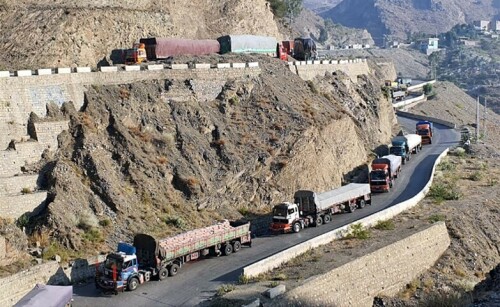ISLAMABAD: The Supreme Court on Tuesday set aside the Peshawar High Court (PHC) judgement directing the National Accountability Bureau (NAB) to investigate the Peshawar Bus Rapid Transport (BRT) project.
A three-judge SC bench, headed by Justice Umar Ata Bandial, took up an appeal moved by the Khyber Pakhtunkhwa government challenging the view taken by the high court that the BRT project was based on “shifty and shaky” foundations.
Apex court also extends for another month stay against similar directive for FIA
The PHC had also held that the project was overpriced and lacked necessary approvals, besides entailing exorbitant costs. It also expressed the view that the project was unnecessary and the public money ought to have been spent on other more necessary projects rather than on BRT.
On Tuesday, senior counsel Makhdoom Ali Khan, appearing on behalf of the KP government, submitted that the PHC decision suffered from a series of legal defects, highlighting that earlier a different bench of the PHC, headed by Justice Yahya Afridi, had dismissed a similar petition challenging the BRT project.
No appeal was filed by anyone against that judgement which became final. Later another division bench of the PHC reopened the same case without anyone having filed a review petition against it or having called it in question under any legal provision, he said.
This was done on a report submitted by traffic police on rerouting of traffic in Peshawar due to BRT, the counsel argued, adding that the PHC had on the basis of that report ordered NAB to investigate the project.
The counsel said there was no evidence or other legal basis for this PHC directive. In any event, he argued, such a directive could not have been given on a petition which had already been decided in favour of the KP government by the PHC and that decision remained unchallenged.
The Supreme Court accepted the appeal, set aside the PHC judgement and quashed the directive for NAB to investigate the BRT project.
The same bench also extended for another month its earlier stay order against the PHC directive for the Federal Investigation Agency (FIA) to thoroughly probe the BRT project.
This case concerns a set of appeals moved by the KP government through the chief secretary, the Peshawar Development Authority (PDA) and secretaries of the KP local government and rural development and transport department seeking to overturn the Nov 14, 2019 judgement in which the PHC had formulated 35 questions and referred the matter to the FIA for a thorough inquiry.
Earlier, the counsel argued that the high court verdict could not sustain for three reasons, the first being that the reasoning of the judgement spreading over 11 pages did not come from the documents or reports which were on record before the court.
Moreover, the high court order did not mention any of the pleadings of the petitioner before it; rather it was a ‘cut and paste’ from a document extraneous to the record which was also evident from the fact that it referred to annexes which were not attached to the judgement. It also referred to a phone number and name of a consultant, the counsel told the court.
Secondly, the PHC without any reasons accepted the petition and referred the matter to the FIA. Besides, the high court order did not add a word of analysis or reasoning of its own.
Thirdly, the counsel argued, petitioners before the high court had simply prayed for the obstructions in front of their houses to be removed. But what the high court ordered was beyond the scope of this prayer, the counsel argued.
In the appeal, the petitioners argued that the high court had travelled beyond its jurisdiction in deciding factual and technical controversy in a writ jurisdiction, which could not be resolved without recording of evidence.
The appeal also asked whether the high court was competent to discuss technical aspect of the BRT project in the absence of any technical expertise without acquiring any expert in the relevant field.
While deciding the case, the PHC had held that the concept of town planning was Greek to the decision-makers as the Peshawar city was mainly fed by a single traffic artery of Khyber Road. Due to this factor alone, Khyber Road and branch roads are mainly congested, but no efforts have been made to relocate the wholesale market outside the main city. Besides, the idea of ring road for the city that emerged in the 1980s also succumbed to the prescribed procedure, especially for a mega project.
BRT was part of the Annual Development Plan of the province and hence enjoyed the approval of the provincial legislation, the appeal had argued.
Published in Dawn, February 3rd, 2021













































